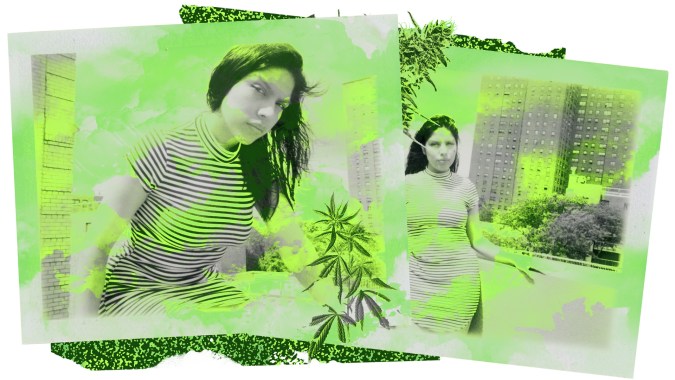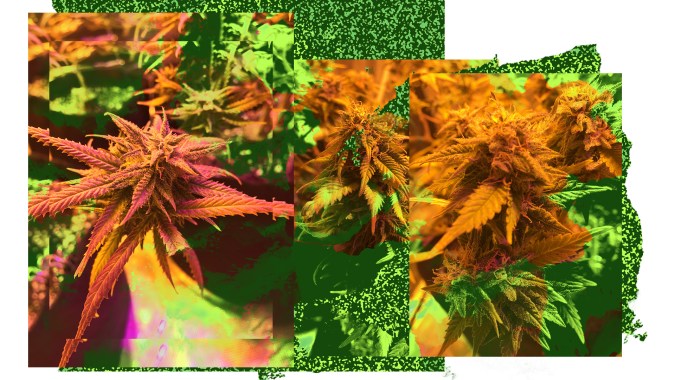Sonia Espinosa is the kind of person, it seems, who could find an answer to any problem. When her immigrant parents didn’t have enough money to send her to college, she kicked into gear — the superlative student went ahead and got herself into Harvard on a full ride scholarship.
So why, degree in hand, did she get into marijuana?
Trust an Ivy League student to have a historical metaphor on hand with which to answer. “In college I focused a lot on undocumented populations and how they functioned economically,” she says. “It’s interesting, undocumented people are really similar to marijuana because of two things; they’re both commodities and they both have a really long history of being stigmatized. But while one — weed — is slowly becoming legal, the other one remains illegal. It’s because of direct benefit. With weed you have the medical benefit, the monetary benefit. With undocumented people, illegal labor, you have an indirect benefit. You don’t know if your strawberries are picked for six dollars or less by somebody who didn’t have papers.”
Familial connection and socioeconomic import aside, in the era of Whoopi & Maya, Tumbleweed Express Drive-Thru, and Leafs By Snoop, it’s a retrograde mind that thinks being in the weed industry is a come-down. And Massachusetts — where Espinosa currently resides — is five months into the passage of Question 4, the ballot measure that legalized recreational marijuana.

Particularly of interest to Espinosa is language that was written into Question 4 regarding “procedures and policies to promote and encourage full participation in the regulated marijuana industry by people from communities that have previously been disproportionately harmed by marijuana prohibition and enforcement and to positively impact those communities.”
Yes, reparations for the war on drugs. You know, the one that involved 3,528 federal marijuana prosecutions just last year, 77 percent of which featured Latino defendants.
On one hand we have people making money from weed, on the other, people getting arrested and deported from it.
Even in states that have legalized marijuana, it’s plain to see that POCs are not getting the lion’s share of the profits. In the two years after Amendment 64 passed in Colorado, the rate that black and Latino kids were arrested for marijuana crimes actually rose by more than 50 and 20 percent, respectively.
Reparations are a beautiful concept, but admittedly one that is not yet concretely defined in Massachusetts. That’s where Espinosa and her circle of talented associates come in. Alongside Kamani Jefferson, Jacob Plowden, Kristin Jordan, and Nelson Guerrero, Espinosa co-founded Cannabis Cultural Association, a group that supports entrepreneurs from underrepresented communities who are looking to learn the ways of the marijuana industry. CCA does workshops on technical know-how and legal issues, not to mention hosting networking opportunities that are key to getting a job in the green field.
Recently, Espinosa has shifted gears to focus on her work with the Massachusetts Recreational Consumer Council, another group that she co-founded that is looking to build ties with marijuana consumers, businesses, and politicians.

The MRCC’s top concern at the moment is marijuana safety, keeping pesticide and mold out of retail plant. It’s yet another issue that could be worked on by opening up access to the marijuana industry, says Sonia. “It’s very important to have a low cost entrance so that more people can participate legally in the market. If you allow more people to enter, you’ll have higher quality, safer product because competition makes innovation happen.”
“Using a word like ‘cannabis’ just makes marijuana more palatable to the white consumer market.”
One way that the MRCC is opening up access to the green rush is through educational offerings like #WeedTalk, a regular video series that opened with an episode featuring a legal Q&A with Shaleen Title — a senior staffer on the Amendment 64 who now works for a marijuana recruiting firm — and Shanel Lindsay, inventor of the Ardent Nova Decarboxylator. (A miracle machine that turns flowers’ THCA into THC, cutting out the edible middleman and making it so you can literally pop treated buds into your mouth and get high.)
Sonia didn’t really start smoking weed until college— save for a rebellious moment as a Wisconsin teen, when she smoked in her room during her own birthday party with family to scandalize her parents. Later however, she discovered weed’s usefulness in dealing with trauma.
She’s big on the plant’s history, the way that it has been used by people in the Americas culturally. But she also thinks it’s important to remember the painful history of marijuana, like narcotics commissioner Harry Anslinger’s anti-Mexican 1937 “Gore Files” campaign that resulted in the drug becoming illegal in the United States.

It’s crazy how times have changed. “Now you have a lot of white men making a lot of money from the plant — a plant that was once demonized, considered part of reefer madness, considered as dangerous as heroin,” says Espinosa. “On one hand people making money, but on the other hand people getting arrested, getting deported from it. We need to talk about this, make it something that’s spoken about, at least in our communities.”
She’s not big on the current move to conceal marijuana’s controversial past with innovative branding and pretty packaging — an opinion that extends (despite her past work at the CCA) to overuse of the word ‘cannabis.’
“I think that it’s important to respect the name marijuana,” she says, repeating the word twice, once with the English language appropriation and once with its original Mexican intonation. “Using a word that has an Indo European root like ‘cannabis’ just makes it more palatable to the white consumer market. Just because you call it cannabis it doesn’t make it any different, it’s still marijuana. This is our plant, this has been our plant, we were demonized for it. Why all of a sudden, now that it’s decriminalized, it doesn’t carry the same name that once made it criminal?”
She makes a good point — legalization is supposed to be an amelioration of an unfair stigma that was racist from the start. Divorcing “before” marijuana from its “after,” legalized reality is to suggest that they’re two different substances, that the upscale white ladies are smoking something different than the black and brown teens were, and still are, getting arrested for.
Not on Espinosa’s watch, though — and she’s in it for the long haul. Espinosa has already started her own art-focused weed collective EatMe, and even has plans to open her own dispensary in four to six years. That should be enough time for her and her peers to have built a system that doesn’t replicate the prejudiced infrastructure of the prison-industrial prohibition complex so that everyone can feel free to go green.




